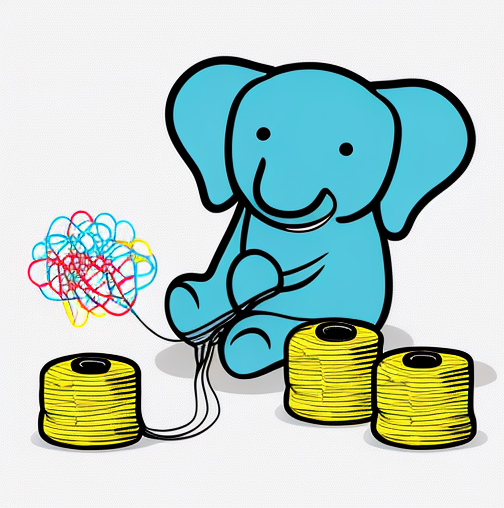Introduction:
In today’s data-driven world, technologies like Hadoop have gained immense popularity due to their ability to handle large-scale data processing and storage. If you’re looking to learn Hadoop from scratch, it’s essential to have the right resources at your disposal. In this article, we will explore ten highly recommended books that can help you master Hadoop and unleash its potential in big data applications.
What is Hadoop?
Hadoop is an open-source framework designed to store and process large datasets across distributed computing clusters. It provides a scalable and fault-tolerant solution for handling massive amounts of data by distributing the workload across multiple nodes in a cluster. Hadoop comprises two core components: the Hadoop Distributed File System (HDFS) for storage and the MapReduce programming model for processing data in parallel.
Why Learn Hadoop?
Learning Hadoop offers several benefits, making it a valuable skill for professionals in the field of big data and data analytics. Here are a few reasons why you should consider learning Hadoop:
- Scalability: Hadoop enables the processing of vast amounts of data by distributing it across multiple machines, allowing for horizontal scalability.
- Cost-effective: Hadoop runs on commodity hardware, making it a cost-effective solution for storing and analyzing large datasets compared to traditional data storage systems.
- Versatility: Hadoop is not limited to a specific type of data or industry. It can handle structured, semi-structured, and unstructured data from various sources.
- Flexibility: Hadoop’s modular architecture allows for the integration of additional tools and technologies, such as Apache Spark and Hive, expanding its capabilities.
Books to Learn Hadoop:
Here are ten books that provide comprehensive guidance for learning Hadoop:
- “Hadoop: The Definitive Guide” by Tom White:
- This book serves as an authoritative guide to Hadoop, covering its core concepts, architecture, and ecosystem of related technologies. It is suitable for beginners and experienced professionals alike.
- “Hadoop in Practice” by Alex Holmes:
- Focused on practical examples, this book offers real-world use cases and step-by-step tutorials to help you apply Hadoop to solve common data processing challenges.
- “Hadoop: The Complete Reference” by Garry Turkington:
- Providing a comprehensive overview, this reference book covers the fundamentals of Hadoop, its internal components, and advanced topics like security and administration.
- “Hadoop Operations” by Eric Sammer:
- This book focuses on the operational aspects of Hadoop, including cluster planning, installation, monitoring, and troubleshooting, making it an invaluable resource for system administrators.
- “Hadoop for Dummies” by Dirk deRoos:
- Written for beginners, this book simplifies the complex concepts of Hadoop and explains them in a beginner-friendly manner, making it accessible to individuals with limited technical knowledge.
- “Big Data: A Revolution That Will Transform How We Live, Work, and Think” by Viktor Mayer-Schönberger and Kenneth Cukier:
- Although not solely focused on Hadoop, this book explores the significance of big data in today’s world and provides insights into the impact of data-driven decision-making.
- “Hadoop: Beginner’s Guide” by Garry Turkington:
- Aimed at beginners, this guide covers the basics of Hadoop, its ecosystem, and practical examples to help you get started with hands-on projects.
- “Hadoop in Action” by Chuck Lam:
- This book offers a hands-on approach to learning Hadoop, providing practical examples and real-world scenarios to demonstrate how Hadoop can be applied to solve data problems.
- “Hadoop Application Architectures” by Mark Grover, Ted Malaska, Jonathan Seidman, and Gwen Shapira:
- Focusing on the architectural aspects of Hadoop, this book explores different design patterns and best practices for building scalable and efficient Hadoop applications.
- “Hadoop for Data Science” by Ofer Mendelevitch, Casey Stella, and Douglas Eadline:
- Tailored for data scientists, this book delves into the intersection of Hadoop and data science, showcasing how Hadoop can be leveraged to extract valuable insights from large datasets.
Conclusion:
Learning Hadoop can open up exciting opportunities in the world of big data. By exploring the recommended books mentioned in this article, you can gain a solid foundation in Hadoop’s concepts, tools, and applications. Remember to practice hands-on exercises and experiment with real-world projects to solidify your understanding of Hadoop’s capabilities.










Leave a Reply